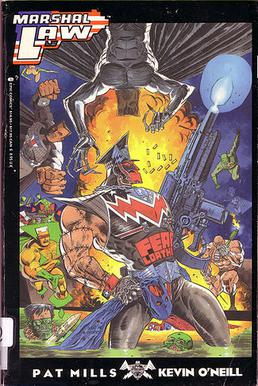Books like Marshal Law: Fear and Loathing
Marshal Law: Fear and Loathing
Marshal Law is a high-octane black comedy, a satire on superheroism which tackles many of the same themes as its contemporary, Moore's much-lauded 'Watchmen'. But while Moore takes a serious, realistic tack in his deconstruction, Mills' satire is much more overt and over-the-top.Like Moore, Mills is showing how ridiculous it is to take superheroism at face value, and trying to show what people would really be like if they had superpowers: naive, amoral rockstars bent on attacking anyone who doesn't agree with them.Mills keeps the violence of comics, as well as the twisted, overwrought sexuality, but he removes the entertainment value. He actually makes sex and violence disturbing and difficult to read--in a comic book--an achievement I find it difficult to overstate.The book isn't easy to read, but its enjoyable because of Mills' insights on nationalism, colonialism, dystopia, war, killing, and sexual subversion. It's about Empire, about responsibility and power inequality, and Mills never shrinks back from the darkness.He's a clever guy. The way he plays with the cliches of feminist theory versus the symbolic misogyny of comics is amusing and insightful. Likewise, his deconstruction of Superman ranks up there with Moore's 'Dr. Manhattan', Kirkman's 'Omni-Man', Bendis' 'Supershock', or Miller's take on The Man of Steel in Dark Knight.The art is great, too. I knew O'Neill from 'League of Extraordinary Gentlemen', but he really shines here. The series is built on a lot of little references, in-jokes, and subversions, and the minutiae really help to build and maintain the complex world.I would definitely point to this book as a great example of doing world-building gradually, with the introduction of details that fit together to produce a whole. We don't waste time on long flashbacks or setups, and there's not much expositionary dialogue. Mills gets you into the story, into the action, and starts playing with ideas from issue one.It's been said that this is a comic book for people who hate super heroes, but it shows a thoughtful fondness for the genre. In truth, the hatred is saved for what superheroes inevitably become: unchanging, mythical, overpowered, melodramatic, with incomprehensible back stories, endless retcons, and which always return to the same old familiar thing.For me, this backlash is understandable, but then, I've never been able to get into huge, iconic, longrunning comics. I like a miniseries, something that has an end, and a character arc--and while some authors are able to maneuver a good story out of a played-out institution, most of them just keep the soap opera moving.Marshal Law doesn't suffer from this common malady. It's well-written, thought-provoking, disturbing, and funny. It deserves to be more well-known, but its subversion isn't as easy to gloss over as 'Watchmen'. To appreciate it, you have to love what comics can be, but resent what they usually are, yet without the pretension one gets from some indy books and fandoms.It's a love for comics precisely because they are dark, dirty, and absurd. It brings to mind a snatch of a Gaiman interview, where he intones that he's never liked the term 'Graphic Novels', because he likes comics, and he writes comics. Like him, Mills is writing somewhere between pulp and Art, which is a precarious place to be, but much more interesting than the alternatives.\
My Suggested Readings in Comics\

